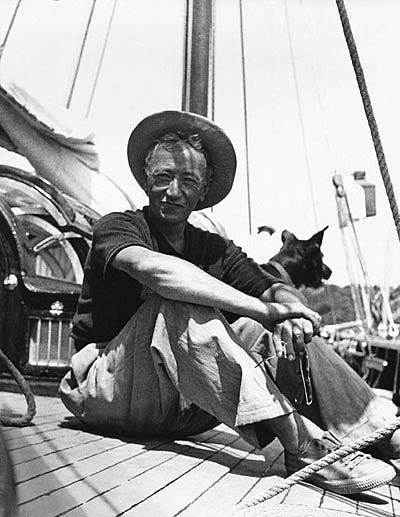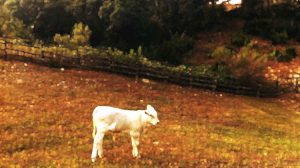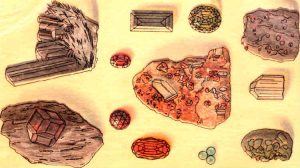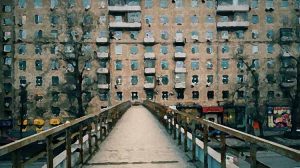
His face is hung on the top of my bed. Most of the time, when I walk towards the bed, I see the reflection of his face. I burst in anger. Before I go to sleep, I plan on how to get rid of him while washing my face, thinking, how dare he restrain me. He has no voice. His image is so strong that, at the moment I see his friendly smile on the wall, my stomach cramps up. I look at his face which he doesn’t like it when I splash water on my own. As water touches my face, it feels like his eyes touch my eyes, his lips touch my lips.
I don’t want to lose my sleep by surrendering myself to the excitement of the words that he blows from the gap of my mouth. I resist. It doesn’t work. From the moment I surrender myself to the soft bosom of the bed, he puts his meaty lips on my ear. Sometimes he sings a Romaic song – oh how well I fall sleep then – and sometimes he talks on. He persistently tells the names of people from his time: Stelyanos Hrisopulus, Eleni, his madams, Seigneur Ahmet, the tradesman, people who call him, Yorgiva, the postman, the names of prostitutes, the shrimp fisherman, the fearless youngsters, the carters one by one. He yells all names into my ear. He continuously whispers the names of the people who came into his life, whose names are written down on his papers, without skipping. Sometimes I say, that’s enough, I close my ears with my hands. Enough, enough. What will I do with so many people? All of them died. Do not speak with me from the underground. You died too. Leave me in peace. Do you know how long it has been since I fell asleep without dreams? Since I leave your face and do not dream. Leave me, I say, leave me now. Let me not know the salt of the sea, the smell of the moss, the mixture of melon and raki.
He doesn’t listen. He doesn’t mind. He laughs away, no matter how tall I rise before him. He shrugs to all the things I care about. My pajamas do not have pockets, but go to bed with me, I say. He never refuses. His face shrinks; it becomes smaller than my palms. He goes to bed with me. Oh my, oh my, he says. I purse his lips between my fingers. He puts one of his ears on my breast, his lips sprawl towards my stomach. Sleep now, I will whisper stories to your hands, he says. Do not stretch your arms; do not stretch your back. Surrender yourself to the dreams from years ago; let yourself go to the waters of the island. Scatter your anger to the sunburn besieged all around. Time is mine. I can stop the time. Not enough. I can turn the clock back. To the period you always wanted to live. I can pull you over myself. I reach out and grasp your neck, down from your arms. Your breast opens; my breast opens towards the painful night. You sing the song of the exiled ones with me; you touch the sea with your feet. Maybe then I will answer the question of how I write. I will reveal my madness to you as clearly as light. I will give you the beginning of a story before you finish your sentence. You will be baffled. Oh my god, you will say, how did this sentence penetrate my tooth? So then I will raise you from the bed. From that nice and warm bed. I will want your back to be cold. I won’t feel sorry for you. I will burden many stories on you. Let’s see, can you carry the weight of so many people?
He gets pissed off. He gets angry about my laziness and sleep addiction, his lips stretched like a rope. I hope for help looking at his thin lips. I laugh into my sleeve. I look for running into the thinnest part of his tender heart. I will catch him there and I will make him believe me. I will play my people with carte blanche in the face of people too. He puts his arms on my shoulders; he pulls me towards himself like he teaches dancing to the tyrannical, white-dressed man, like how he says, “Yasssuu.” I crawl from the bed, my legs meld. My eyes lose sleep. I go out to the balcony. To feel the weather on my legs. It doesn’t hurt; I get into his pocket like Panco instead of him getting into mine. He lifts me upon the bars of the balcony. He shows the city first. He swears. You spoiled the city, he says, you messed it up. He saves his stomach from the high buildings’ edges by keeping it in. He passes on Anatolia. He breaks his back right away. Towards the islands. He raises his arms upon his head, he claps while he flies (we think it’s a lightning flash).
His thin body holds my liver with his right hand; he steadfastly carries me away towards the island. He is the first rhythm of tango, he’s so strong; I am the fourth musical note, how dim. But I arouse and reach life with him. I rise on my tiptoes by holding his face that he swears in front of the mirror that he doesn’t like for his life. We arrive at the seashore like we’re flying. Will we jump on the back of John Dory? We will. Will we swim to Burgaz? We will.
Towards Antigone
Antigone. . . The prince island that gets its name from the majestic Antigone – the father of Demetrios, one of the generals of Alexander the Great. Antigone, on which wooden mansions, fish restaurants on coastline, a small bazaar, unlovely concrete houses in between are splattered, is covered with pine forests on top; it looks towards the Spoon Island and to the Heybeli Island with its striped streets. It makes the sun red from the side of Kalpazankaya. Rumor has it that the first money piece was printed on these rocks. People go swimming from its graveled beach now. On the hills that were injured by the fire, cloves and tomatoes grow. Antigone heaves a sigh after the Rums, Jews, Armenians, lovers, fishermen, drunk writers, unlucky poets, and painters whose fingernails are black, all who passed from its soil. And it misses him the most. The man who wears a trench coat and a fishing hat, wandering with a black dog after him.
We reach a white triplex house from the wooded roads of the piece of land broken away from the land. We close the garden gate after us, when we go up the stairs of narrow porch, he shushes me by putting his finger on his lips. “My mother sleeps.”
I stand in front of the painting given by Bedri Rahmi. He drew a Sait Faik with blues and greens. On painting’s level, there is a soil pitcher on the coffee table under it, painted by Bedri Rahmi too. Near the blue sofa suite, there is a small, rotating bookcase. The first editions of many books, which we memorize as sacred books, overflow in the bookcase. I hear the stairs’ creak when I am lost in thoughts within the book. I get excited as a child who’s going to misbehave; I get a roll closed with a rubber band from the bookcase. I sit on the dining table in the sitting room. Hand writings. I am short of breath. I open the roll. Is it a story that I’ve never seen before, or is it the first copy of one of the stories I’ve read thousands of times? Will my eyes touch the points the pen touched? I let my first breath out with a sudden disappointment: Old Turkish. How strange! I’ve never thought that he wrote his stories in old writing. I feel happy when I turn a page, there are notes in Latin over the old writing. The stairs creak again. I’m scared to death, hoping he won’t come down.
Between the old letters, this sentence is scrawled: “People pulled me over themselves like a magnet. I wanted to embrace the world and the city faithfully.” The date is written where the letters are finished. On the back of 935th page, another sentence: “I learnt from the book. I acquired the desire of certain love from the books. Then it got in my blood. I had to fall in love.” There’s a name near the sentence. It cannot be read. There are some words listed one after the other on the empty edges of another page: triphone, lame seagull, ferry, and southwester. I get bored when the lead pencil becomes rubbed out. I continue turning the pages one by one. One of the old Turkish sentences is crossed out again, and this was written instead: “We were not going on an adventure in Spoon Island.” In another space, this was written: “The smile like a stab wound near your lips.”
I push the porcelain plate with pink flowers and silver spoons. I massage my temples and think. These sentences, these stories, called me among people. These words that came out from the lead pencil opened my eyes. The adventure of everyone, in whom the seeds of writing exploded and turned green, started with reading one of the stories. The taste of life was distilled from those hand writings, and we loved carriers, porters, workers walking on streets much more. After each story, let me kiss your hands, we said from the inside.
The Man Who Forgot the City
I flurry with the warmth of the big hand grasping my shoulder. I hurriedly roll the paper again and reach it out to him. He grumbles, he puts the roll in his inside pocket without moving the lines tearing his cheeks. Stubborn man. He always does this. He displaces me from my bed and he frets as well. He always wants me to wonder about him, to be troubled about how he is. Then, when I coddle him or want to read the things he wrote, he shows bad temper like that and he continuously fires away.

He points the stairs with his head. I stray after him. We go upstairs. He opens the door of his room. We enter. I first see the city lights shining from the window. Then the curvy line of the church’s dome that is so close that I think I can hold it with my hand. The elegant writing desk in front of the window, the books piled over it. His writings. His inkwell and inkstand. His dryer. When I look behind me, I see that he sits on his narrow, iron bed tiredly. Blue and white striped pajamas and a red water bag on his bed. My heart sinks. Are his feet cold? Does he have a stomach ache? He leans and unlaces his shoes and sighs. He takes off his worn-out, cracked leather shoes and puts them under the bed. What did the man who forgot the city say by looking at this room?
“I gathered my joy, which fell on my tiptoes and broke, with my eyes. I turned to the reverse side, to my home, and I reached my room. Four walls, one window, some books inside a suitcase, and an iron bed… I strolled in my room, which is a prison in a nutshell, without thinking, without even reading.”
He gets the bottle on which “authentic cologne” is written on the label, standing on the bedside table, and opens it. He pours the cologne in his palm; he rubs his nape with his hand. He holds his waist and swears to the ache on his liver. I reach out and take the bottle from his hand. I rub his temples with the cologne. I hold his shoulders and make him lie down on the bed. Is he smiling? “From there,” he says, by pointing with his head at the mirrored console on which a stoup and a porcelain pot stands. “Open it, pour some raki for me.” I’m scared of making noises. I take the glass that closes the pitcher near the cologne. I crouch down the console and open its door. A raki bottle with a peeled label. I pour the clear liquid into the glass. He makes a gesture with his eyes to tell me to pour some more. I pour some more. I give the glass. The glass moulds in his big hands. He squints at me. On the table there are French editions of The Flowers of Evil and Metamorphoses and Hemingway’s Old Man and For Whom the Bell Tolls published by Varlık Publishing House. And his book, The Café of the Neighborhood, published by Varlık again… I look at the pages in front of me. I pull the chair quietly and sit. There is Agios Ioannis Church outside, how big, how magnificent. I turn back and look astonished; this time it’s written in Latin, for me. For me to read. He raises the glass in his hand towards me. He says, by pointing with his head, “Enjoy your meal, kid,” and smiles. For a moment, my eyes gaze on his fat stomach, and then I turn forward and start reading not to make him bad-tempered.
“If I go to the beerhouse at that passage. I sit on that table, that table. People come and sit in pairs, women and men. I, on my own. On my own in millions. Bitter gradually gets more bitter. Like the bitterness of a melon, bitter like poison. The thing we find after we lose. Guess what it is? Guess what it is? The thing you cannot find without losing, you couldn’t guess, raise and shoot! Who looked from the window? Why? Close your eyes, close. Do your hands grow? No, they don’t grow. They don’t grow, they don’t, hooray. But it hurts, it doesn’t hurt, don’t lie. It’s like, there’s something on your heart, isn’t there? Lie. You certainly read it somewhere. Or someone told you. Or you remember it like that. There’s nothing on your heart. Loneliness. Loneliness is good. It’s not good. Melon’s bitterness. What is melon’s bitterness?”
Bitter as a Melon
I turn in my chair and look at this person created by loneliness. I like the V-line of his slightly opened hairs on his forehead. It hurts in my heart when I see that he seems lonely like a melon’s bitterness no matter who is near him. I don’t know if he turned himself into a stubborn man in order to suppress the feeling of loneliness which he couldn’t put somewhere for his short life. I think about his embarrassment when looking at women, his shying away from caressing youngsters’ heads, his detraction of himself whenever he loves someone, his strolling from wall to wall for hours in this room. There he is. The man who forgives the fisherman, to whom he got angry, in return for two hard-burnt large bluefish – although they were not fresh. The man on whose passport is written “he has no art.” The unnecessary, lost man who dies away on the streets. He fills both the island and Ankara with his name. Sorrow is too much for me. I leap up. “Enough, come on!” I say. “Let’s go out, the night is young.”
He says, “hey,” and leaps up, as if he was not the tired man who held his liver and suffered just moments ago. We go out. He whistles after we walk a little. A carter, whose name is Ali Rıza as I will learn a little later, comes and stands in front of us. “Jump in, brother.” We jump in. “To Kalpazankaya,” he says. They must have already prepared the meal at this time of night. We are going to accompany fresh fish. For mercy’s sake, I hope he’ll cheer up, smile. Nothing else matters.
We get off at Kalpazankaya. Hopping on big stones, we find the fishermen at a quiet place where sea cuddles up to the soil. They invite us in. He helps himself to more raki, as if he didn’t drink at all at home recently. I watch him without drinking. There’s a breakaway in me. I want to remember every moment we spend together. After having a chat with the fishermen, he leaves them and turns to me. “Did you see?” he asks. “We came to the island because of a liver issue, but now we belong here. The island makes me drink more instead of healing me.”
He is lost in thought by looking at where sea sparkles wave. He asks if I write or not. No, I say, I cannot do well. I don’t know. He tells me that, so to say, he will give up writing when he comes to the island and he is decisive in this. “I was not going to write anymore. I was tired of running after stories. I was tired of waiting for the postman, do you understand? The issue was not to find the story; the story was always inside me. I could keep telling on my own, so what? But the waiting. In search of books, at least, plunk down money and get the book. It was good if it was published in a journal, you could make a few bucks. You could make the money for the beerhouse, anyway. I didn’t write. One day, two days. Ten days. I couldn’t stand it anymore on the fourteenth day. It seems like I started writing again. Could I blurt something out if I took that pen in hand months ago? I don’t think so. Oh, that’s a good thing! But why did that night force me to scribble something? I ran out and bought pen and paper from the tobacco seller. Sentences spouted. The story came out at once. ‘Oh,’ I said, ‘I’m losing my head.’ I ran down from that hill and I threw myself to the sea. I wanted to clean myself up from the story. No, another story came. I went to the sea and wrote again by soaking the paper. Do you understand? Then I was filled with joy. I thought about those fishermen. I sat and wrote about them. I thought about the hips of the woman living in the back of the island. I sat and wrote about her. I thought about the carrier kids who stoop and my sweetheart who says ‘I’m still a girl,’ with a beauty spot on her cheek, leaned on the tavern’s wall. I thought about the pickpocket who I allowed to rob me on the tram, the paving stones of Beyoglu. ‘Damn,’ I said, and submerged into the paper again.”
Sait Faik is in Agony
He stands up in agony. I take him from under his armpit. The carter has waited on us for too long. Drive slowly, I say, do not shake. Going home, home. It will be dawn soon. When we get home, he cannot find the strength to go upstairs. He lies down on the blue sofa. I think we made noise this time. His mother comes rattling. She scolds him first, then me. She lays coverlet over her incorrigible son. I run away upstairs in haste. I enter the room filled with books across his room. He has very few books… Who knows to whom he lost his books. I pull a book from the shelf. André Gide. How he liked Gide. I look at Radiguet’s Le Bal Du Comte D’Orgel, Sartre’s Les Mains Sales, Swann’s Love. Journals are stacked on the shelves below: Yaprak, Marko Paşa, Varlık, Yeditepe, Nuhun Gemisi (Noah’s Ark). . . . More than half of the books are in French. And there are lots of grammar books written in old letters. On the other side, there are Orhan Veli, Orhan Kemal, Ziya Osman Saba, Tanpınar. . . . He hung his photo with Leyla Erbil, from the night with plenty of wine, on the wall. Near that, there is another photo of him with his black dog on the beach. . . . He put the ones he didn’t hang in a box. Tens of photos taken with Bedri Rahmi, Nazım, Peride Celal, carters, stragglers chewing tobacco, in high school and before that in Adapazari, taken with his mother. The same loneliness in all of them. The same dissatisfaction with himself. However, the ones who write see your face at first when they close their eyes. Pleased with what they see, they smile, they take courage. Oh, of course you never knew that.
 I have to go out from this beautiful, white house on number 15, at Çayır Street. I have to swim back to the city. I have to tell this agony of love inside me to everyone. The agony he put inside me, inside us. I have to tell everyone about each squealing girder, about the mother’s eyes that grow wide when looking at her son, about the straw hat he wore when he went fishing, about some people permeating into this house, about Eftalikus, chestnut seller, Alexandra, about unemployment, bullace grape, bonito, snapshots, the carter going to Atikali. I have to draw the face of a child of the man who crashed on the couch downstairs somewhere. Until he makes me lose my sleep again, I have to divide the cloud that I filled from the well in the backyard between all children.
I have to go out from this beautiful, white house on number 15, at Çayır Street. I have to swim back to the city. I have to tell this agony of love inside me to everyone. The agony he put inside me, inside us. I have to tell everyone about each squealing girder, about the mother’s eyes that grow wide when looking at her son, about the straw hat he wore when he went fishing, about some people permeating into this house, about Eftalikus, chestnut seller, Alexandra, about unemployment, bullace grape, bonito, snapshots, the carter going to Atikali. I have to draw the face of a child of the man who crashed on the couch downstairs somewhere. Until he makes me lose my sleep again, I have to divide the cloud that I filled from the well in the backyard between all children.




Cy Lester says
In a long life of reading, I will remember the feeling of reading this portrait of a writer.